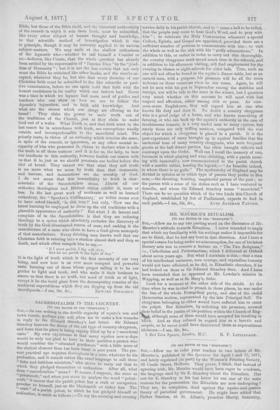SACERDOTALISM IN THE COUNTRY.
tTo nut EDITOR OF THIS "SPECTATOR.") SIR,—As one writing in the double capacity- of squire's son and town curate, perhaps you will allow me to make a few remarks in reply to Sir Edward Strachey's last letter. Sir Edward Strachey laments the decay of the old type of country clergymen, and fears that its place is being rapidly filled up by a sacerdotal caste My own experience is that many squires now-a-days would be only too glad to have in their parishes a parson who would combine the "educated gentleman " with a little more of the clerical element than has been usual in past years. The pre- sent practical age requires thoroughness in a man, whatever be his profession, and it sounds rather like cruel language to call those "false and faithless ministers," who strive to carry out that to which they pledged themselves at ordination. After all,, what does " sacerdotalism " mean ? It means, I suppose, the same as " priesteraft," and when you come to analyse the word "priest- craft," it means that the parish priest has a craft or occupation peculiar to himself, just as the blacksmith or tinker has. The "Craft" of a parish priest, to which he has pledged himself at ordination, is much as follows :—To say the morning and evening service daily in his parish church, and to "cause a bell to be tolled, that the people may come to hear God's Word, and to pray with him" ; to celebrate the Holy Communion whenever a special Collect, Epistle, and Gospel are appointed, provided there are a sufficient number of persons to communicate with him ; to visit the whole as well as the sick with his " godly admonitions." In addition to this, or rather in order to carry out this thoroughly, the country clergyman must spend much time in the schools, and in addition to his afternoon visiting, will find employment for the evening in classes or night-schools for older lads. True, such an one will not often be found at the squire's dinner-table, but as an earnest man, with a purpose, his presence will be all the more welcome on those occasions when he can come. Again, he will not be seen with his gun in September among the stubbles and turnips, nor will he ride to the meet in the winter, but I question very much whether on this account he will meet with less respect and affection, either among rich or poor. As com- mon-sense Englishmen, they will regard him as one who knows his duty and does it. No doubt a country clergyman who is a good judge of a horse, and who knows something of farming, or who can back up the squire's authority in the case of troublesome tenants, is a very useful man to many squires, but surely these are only trifling matters, compared with the real object for which a clergyman is placed in a parish. It is the past experience of many brought up in squires' families that the unclerical tone of many country clergymen, who were frequent guests at the hall dinner parties, has often brought ridicule and contempt upon the Order. Well can I recall the memory of one, foremost in whist-playing and wine-drinking, with.a parish teem- ing with immorality, now commemorated in the parish church with a marble tablet, bearing the legend,—" An Israelite indeed, in whom there is no guile." The squirearchy of England may be divided in opinion as to which type of parson they prefer to live near,—the shooting, hunting, magisterial parson of the past ; or the parson with a sense of his duties such as I have ventured to describe, and. whom Sir Edward Strachey terms "sacerdotal." There can be no question which of the two kinds this Church of England, established by Act of Parliament, expects to find in.


































 Previous page
Previous page